This week we travel to a future where there is so much fake news that nobody can tell what is real anymore. Are we already there? What happens next?
This week’s guests include:
Amy Webb — Founder of the Future Today Institute, and author of The Signals Are Talking: Why Today’s Fringe Is Tomorrow’s Mainstream. Amy explains that we’ve been here before, how technology is accelerating the pace of fake news, and what keeps her up at night.
Brooke Borel — a science journalist and the author of The Chicago Guide to Fact Checking. Brooke explains what we reporters can learn from science reporters, who’ve dealt with fake news for a while now, and how we can all be better fact checkers.
Enrique Armijo — an associate professor of law at Elon University where he focuses on the media and first amendment issues. He describes his trip to Rwanda, where they tried to crack down on dangerous journalism after the media aided in a genocide.
Some reading from the episode:
- This Analysis Shows How Fake Election News Stories Outperformed Real News On Facebook
- Facebook fake-news writer: ‘I think Donald Trump is in the White House because of me’
- Washington gunman motivated by fake news ‘Pizzagate’ conspiracy
- Pizzagate is a lie. But what it says about our society is real
- Is Social Media Disconnecting Us From the Big Picture?
- Don’t believe anything you read at Natural News
- Fact-checking doesn’t ‘backfire,’ new study suggests
Flash Forward is produced by me, Rose Eveleth, and is part of the Boing Boing podcast family. The intro music is by Asura and the outtro music is by Hussalonia. Special thanks this week to Diane Kelly, Matt Weller, John Oloier and Caroline Sinders. The episode art is by Matt Lubchansky.
If you want to suggest a future we should take on, send us a note on Twitter, Facebook or by email at info@flashforwardpod.com. We love hearing your ideas! And if you think you’ve spotted one of the little references I’ve hidden in the episode, email us there too. If you’re right, I’ll send you something cool.
And if you want to support the show, there are a few ways you can do that too! We have a Patreon page, where you can donate to the show. But if that’s not in the cards for you, you can head to iTunes and leave us a nice review or just tell your friends about us. Those things really do help.
That’s all for this future, come back next week and we’ll travel to a new one.
▹▹▹▹▹▹▹▹▹▹▹▹▹▹▹▹▹▹▹▹▹▹▹▹▹▹▹▹▹▹▹▹▹▹▹▹▹▹▹▹▹▹▹▹▹▹▹▹▹▹▹▹▹▹▹▹▹▹▹▹▹▹▹▹▹▹
TRANSCRIPT
Rose: Hello and welcome to Flash Forward! I’m Rose and I’m your host. Flash Forward is a show about the future! Every episode we take on specific possible, or not so possible future scenario and try to really overthink what it would be like. We always start with a trip to the future, to hear what’s going on, and then we jump back to today to hear from experts how that future would really go down.
Got it? Great! Today we’re going to start in the year 2020.
[Jingle]
TV News Announcer: In breaking news, President Jim Briskin collapsed today while addressing the public at a Thanksgiving Day parade in Ferguson, Missouri. Medics were on the scene immediately to whisk the president away. So far, there’s been no word on the president’s condition, but we’ll update you as we can.
[Jingle]
TV News Announcer: President Jim Briskin spoke to a historic crowd in Washington DC today, before sitting down for Thanksgiving Dinner with the first family.
[Jingle]
TV News Announcer: Is Thanksgiving cancelled? In a recent interview, president Jim Briskin expressed his desire to nix the holiday from American calendars, saying he would be doing nothing to celebrate and would not be eating the traditional turkey dinner with his family this year.
[Jingle]
TV News Announcer: An FBI agent who leaked emails from President Jim Briskin’s office has been found dead today. The emails were at the heart of a controversy over Briskin’s Thanksgiving plans, suggesting that he would make a secret trip out of the country to meet with the terrorist group ISIS.
[Jingle]
TV News Announcer: President Jim Briskin landed in Iraq today, to meet with members of resistance forces stationed there. The president has faced backlash over his choice to conduct this trip on Thanksgiving, rather than postponing the meeting.
[Jingle]
TV News Announcer: Runners in today’s Alameida Turkey Trot got quite the surprise when President Jim Briskin lined up at the starting line. The president stopped along the route for photos, before heading to his childhood home for Thanksgiving dinner.
Rose: Okay so this is a future, in which there is so much fake news that nobody knows what is real anymore. I have had this future on my list of ones to do for a while now, and it recently became VERY relevant.
Here in the United States there was just an election. And in that election there was a whole bunch of weird stuff that happened, which we don’t really have time to get into, but one of the weird things that happened was that fake news became a huge problem. According to a recent BuzzFeed analysis, fake news stories were actually shared on Facebook more than real news stories.
But let’s back up for a second, and talk about what fake news actually *is*. Because that’s not totally clear.
Amy Webb: [00:04:29] So I think the real crux of the question surrounding fake news has to do with trust and authenticity because the news is is only fake it’s only perceived as fake to people who disagree with it.
That’s Amy Webb
Amy: My name is Amy Webb. I am the CEO of the future today Institute and the author of the signals are talking. Why today’s fringe is tomorrow’s mainstream.
Rose: And Amy says that what you or I might consider clearly fake news, someone else might not.
Amy: The problem is that you’re at the checkout stand and you’re looking at the clearly like somebody took a pair of scissors and cut out a cartoon alien head and taped it on top of somebody else’s body you understand right that that’s not real. But we assume that everybody else shares the worldviews that we have unless they are diametrically opposed. And we we see evidence of that on social media. We assume that if we see something and to us it’s clearly fake that everybody else must think oh this is clearly fake. Everybody clearly understands that this is a made up story. Right. But the problem is that that’s not true. There are people who believe what they see. There are people who believe that that clearly photoshopped alien head is a real alien who has taken over them.
Rose: And in some cases we can fact check things, and say… no, that never happened or this isn’t true. But in other cases, it’s not as clear.
Amy: You know you may think that news coming out of a very conservative Web site is a fake news. Right. Because it doesn’t conform to your ideological or political viewpoints. But if you look at that exact same content through the eyes of you know in this case a conservative person to them that’s that news is very much real. It’s not fake it’s authentic.
Amy: the challenge going forward of fake news is incredibly difficult because who is who is the person deciding what you know what fake news is what is fake about that news.
Rose: So here’s an example. Some people have argued that the major news outlets’ fixation on Hillary Clinton’s emails would fall into the fake news category. But that’s kind of weird, right, because it’s not that the emails weren’t real, or the investigation into them wasn’t real, it’s that the investigation wasn’t as big a deal as these outlets made it out to be. People have pointed out that the major news networks in the United States spent more time covering Hillary’s emails than all the policy positions of the candidates combined. Which is wild!
And since the emails were the main news story of the campaign, you also got a bunch of stories about those emails that were objectively false. Getting back to that Buzzfeed analysis of fake news stories that outperformed real news on Facebook — three out of the five top performing fake stories had to do with her emails. Here are two headlines:
“WikiLeaks CONFIRMS Hillary Sold Weapons to ISIS… Then Drops Another BOMBSHELL! Breaking News”
“FBI Agent Suspected in HIllary Email Leaks Found Dead in Apparent Murder-Suicide”
But Amy’s point is that while we can say, okay, these things didn’t happen, they aren’t based on facts. But for people who believe that, say, Hillary Clinton is the most evil human on the planet, they confirm a worldview. They ~feel~ true. They have a kind of, truthiness, as Stephen Colbert would say.
Amy: And again we’re talking about the year 2016. I’m I’m you know we can see evidence of the problems that are caused. In the year 2016. What we are not talking about is how this lays the groundwork for how we communicate with each other. You know in the next five years in the next 10 years and that to me is is what’s really chilling that that keeps me up at night.
Rose: Because Amy says it’s not just about your or me sharing a fake news story that might confirm our biases. It’s about something bigger than that.
Amy: So OK here’s a great example great example. You know what Russia today is right. OK. My sister. So and for those who don’t know Russia today is a prolific media brand it’s digital. And they they post a lot of really interesting stories in a some of which are very similar to sort of in theme and tone to sort of BuzzFeed. Right. So the really the really the stories that work really well in social media. And you probably have shared a Russia Today story without even realizing it. My sister sent me a Russia Today story on on Facebook and I called her afterwards and I said hey what’s this Russia Today What what what is this. She’s like oh I don’t know is that I’m sorry. She didn’t even know it was Russia today. So the icon that displays are displayed at the time was just arty in a little green square. Right. And and I said oh do you know what this Arti is. And she’s like oh I don’t know isn’t that just one of those cool sites that shares like cool information. And I was like no this isn’t a cool site that shares information this is Russia Today which is a propaganda arm of the Russian government. Right. And you know and my sister’s highly educated and she’s very very smart and she is complicit in spreading what was essentially a propaganda story.
Rose: So what happens when that kind of news, news that is truthy, that isn’t grounded in reality, becomes even more ubiquitous than it is today? And when governments and huge organizations know how to harness the spread of that news to push their propaganda?
Enrique Armijo: I mean I guess my response to that is we live in that world already and you know no one cares that the news is fake because there’s no such thing as fake news.
My name is Enrique Armijo and I’m The professor and associate dean of academic affairs at university in Greensboro North Carolina. [5.9]
Rose: Enrique studies law and the media, and focuses a lot of his work on how to balance freedom of speech with some of the harm that the media can do.
Enrique: You know this isn’t even about what’s true or what isn’t it’s about. Insisting that something is true even despite all evidence to the contrary. I mean these things could be fact checked in real time by people who disagree with those positions or in the comments section or whatever. But you know it’s it’s it seems like none of that matters. So I think this problem is as close to intractable as it’s going to be.
Rose: So Enrique thinks we’re pretty much already here. And in this world, that we’re already sort of living in, we lose a really important function of journalism, which is changing people’s minds. The best journalism, the stuff that wins Pulitzers and actually makes a difference, is the best because it shows us something we didn’t know, and changes our minds about things. So Silent Spring . In a world of fake news, we lose that ability.
Enrique: Persuasion has become impossible. And we just have to figure out what that’s going to mean. If we lose the ability to persuade and we lose the ability to differentiate between what’s true and what’s not. And if we lose the ability to be objective and if we capitulate to the idea that truth is subjective and there’s no such thing as true and false and there’s no such thing as right and wrong then it’s just going to be a matter of you know who can put more butts in the seats. And you know who can know which side has more people that subscribe to their version of the truth. And that is a that’s that’s post-truth. But in a way it’s also Post Politics and the First Amendment and it’s just. I’m kind of struggling here but it’s a world where people are are not just predisposed but convinced. And a world that people are where people agree with someone before they even start to speak. And a world where there is no independent thinking or determinations. As to what’s right and wrong except for the side that you happen to be on. And that’s a very troubling place to live in. But like I said I’m not sure we’re not there for me.
Rose: So, it’s been interesting watching the political sphere react to fake news in the past few months, because it’s kind of like dejavu. Because in science, and science reporting, we’re actually pretty used to this. The concept of people making up completely fake stories about something isn’t new, it’s a tactic that we see all the time. Anti-vaccine websites make things up about the safety of vaccines. Anti-climate change websites make stuff up about whether climate change is real. Anti-GMO coverage is full of just, fake information to make it seem like Genetically Modified Organisms are going to kill us all. We’re actually pretty used to this.
Brooke Borel: I think an actual news outlet as far as science reporting goes, I think the biggest one that comes to mind that has sort of a clearinghouse for science conspiracy theories or anti-science conspiracy theories is Natural News.
Rose: This is Brooke Borel, she’s a science writer and also the author of The Chicago Guide to Fact Checking.
Brooke: I don’t know if you know that website but if you do, I mean last time I checked when I was working on fact tracking back and these numbers may have changed but they were getting something like 2.2 million unique views every month and her Facebook page has over 2 million likes and they there’s you know there’s the tone of that site is a little frantic and old all sort of end of the world but it still will cite actual scientific journals sometimes and or say actual things happening happening in the world and sort of skews it in a way but makes it feel to the uninitiated that it’s legitimate.
Rose: So right now on Natural News here are some of the headlines:
Which causes cancer more quickly: cigarettes, diet soda or GMOs?
Over 30,000 scientists say ‘Catastrophic Man-Made Global Warming’ is a complete hoax and science lie
Gun-free schools in America now training children as resistance militia forces armed with cans of soup
These headlines lead you to stories that are full of misinformation, but they’re incredibly popular in part because they tell people what they want to hear. And because these stories, they often *look* legit, they even include links to scientific studies.
Brooke: There’s a whole long list of things like that that you can try and go through to assess the quality of web site and assessing the quality of the scientific information a web site, but that’s getting increasingly difficult. Not only because people won’t necessarily know how to assess that scientific information anyway but because we’re also seeing this proliferation of predatory scientific journals that are publishing scientific papers that aren’t really that high of quality
Rose: And there’s a set of scientific journals that don’t really do any vetting at all, you just pay them money and they’ll publish your paper without any checking.
Brooke: These journal articles also look super legit. They’ll have an abstract they’ll have you know all the pieces of a scientific journal article that come from scientific journals that have very official sounding names but in reality people are paying huge sums of money to publish their work and there. And someone who doesn’t know that this article is part of a system of predatory journals won’t know that.
Rose: Now, you may or may not have ever seen a Natural News post on Facebook or Twitter. It kind of depends on what your social media experience is like, and how well you’ve curated your little bubble. For those within the Natural News bubble, these stories are shared all the time as fact. For those who think Natural News isn’t a credible source, you probably never see these stories because you’ve trained Facebook not to show them to you.
This is what people call “the filter bubble” right, you’ve told Facebook what you like and don’t like, and it has learned what to show you. Which means that if you liked Hillary, you probably never saw those fake news stories about her selling bombs to ISIS via email. And if you liked Trump you probably never saw pro-Hillary stories. You told Facebook not to show those kinds of things to you, whether you realized it or not.
And this works with science stuff too — if you’re a climate change denier you probably see a very different set of stories shared on Facebook than I do. And you might not even realize that the things you’re sharing are in question, or controversial.
And, before you write off all this fake news stuff as being, unimportant. Or somehow just like, online internet stuff that doesn’t impact the real world. Take this example: on Sunday a man named Edgar Maddison Welch walked into a pizza place in Washington with a gun and pointed it at an employee. Welch fired several shots inside the restaurant, thankfully he didn’t actually hit anybody. He was there, because he had read a fake news story that said Hillary Clinton was running a child sex ring from the pizzeria’s back room. The story is totally false, and you might have never even seen this, but it was shared widely in certain bubbles. Welch, the guy with the gun, said he was there to investigate this child sex ring, that did not exist.
Thankfully nobody at the pizza place was hurt, but this fake news stuff isn’t just online trolling. It has real impacts. And one of the most prolific authors of fake news stories told a Washington Post reporter that he thinks he helped get Donald Trump elected.
So what happens when these filter bubbles get more and more entrenched, and these fake news stories keep coming?
Brooke: I don’t know it’s hard to even picture I mean I guess you just will have what you can already see these divisions across the U.S. and across the world right. Do we just get into tighter and tighter bubbles that we won’t even start we stop you know actually physically going beyond those batteries because it’s actually quite dangerous for us to interact with these other people because they see each other as a threat or we’re going into these bubbles of you know totally unvaccinated populations that are going to give us all. You know the measles or whatever. I don’t know I don’t know what the answer is. I mean what we see is some sort of physical bubbles even more so than we do now that are based on these information bubbles that will people be afraid to even travel to these different places. I don’t know.
Rose: Okay so obviously this is already the case. Marginalized people have to be way more aware of their surroundings and have to think about where they’re traveling and if they will be safe already, today, in 2016. But maybe in the future this gets even worse.
This sort of reminds me of the book The Phantom Tollbooth — which is this story about a boy named Milo who is traveling around this magical land. And in every place he goes to, the rules are totally different and he has to kind of figure out what to do. And at one point he goes through this town called Point of View, where he meets, a little boy who floats above the ground because he has not grown down to it yet. Like instead of growing up from the ground like we do, these people are born floating and grow down to the ground.
This is sort of how it feels sometimes talking about this fake news stuff. On one side we assume that of course everybody starts from the ground and grows up. But the people living in Point of View of course assume that everyone is born floating and grow down. And for Milo, traveling between these various places, it’s confusing and scary and weird. His story has a happy ending, because it’s a kids book, but I don’t know that ours will?
Okay, let’s take a break to hear from some sponsors and when we come back we’re going to talk about what can be done about all this, and whether this future is inevitable or not.
[[BREAK]]
Rose: Okay so, we’ve started to dig into this future where everything is fake but nothing is fake and nobody cares. But before we go any further down that very depressing path, let’s take a trip to the past. Because, as usual, there are lessons we can learn about our future from looking at history. Because this is not the first time that people have been inundated with fake news.
Amy:150 years ago there were there was a you know we were having the same conversation we as Americans were having the same conversation we just called it something different. It was called yellow journalism.
Rose: That’s Amy Webb again. And she says that in order to figure out what’s going to happen in the future, Amy says that it’s really important to look at the past.
In the mid 1890’s there was a war happening between two newspapers in New York City. On one side you had Joseph Pulitzer’s publication, New York World and on the other you had William Randolph Hearst’s New York Journal. And the two were locked in this fight for who could get more readers, or better circulation. And to get better circulation, both papers turned to … essentially fake news.
Every day the papers would sprinkle their front pages with wild photos, big scary headlines, and stories that often included faked interviews and all sorts of just… nonsense! Sound familiar?
So what ended that era? Obviously some of it stuck with us, right, there are plenty of wild newspapers claiming alien abductions and all sorts of other stuff, but in general yellow journalism faded away.
And that happened for a couple of different reasons. First, Hearst and Pulitzer both moved on, and their rivalry ended. But also, journalism started to become professionalized. In 1908 the first journalism school in the United States was founded at the University of MIssouri. And by 1917 that yellow journalism style was falling out of favor. By 1950, most of the journalists working at newspapers had gone to journalism school, which taught a specific set of rules.
Today, some of that is changing. Not only are a lot of the people working at newspapers no longer graduates of journalism school, but a lot of the places that people are getting their news aren’t newspapers.
Amy: But the difference between then and now and more importantly now in the future is speed is speed and scale. So it would have been hard for. Sort of spreading misinformation or what people perceived to be misinformation in the 1850s because most people didn’t have a printing press at home in the year 2016. Most people who want to have access to social media tools and they can engage it by you know by reading the content or by creating misleading content or making it up right or by sharing it where we’re going next I think is infinitely more challenging because of the addition of things like machine learning algorithms and advanced tools which will. In effect create the content for us and share it to us in ways that I think again like when we think about trust and authenticity. This is a really really hard nut that’s going to have to get cracked pretty soon.
Rose: Now, it might be tempting to point to the end of yellow journalism and say “well, we just need to professionalize journalism again. And one proposal I have read about does involve pushing newspapers and news outlets to only hire people with journalism degrees. But I think that’s a dangerous road to go down. And I want to explain why by looking at the case of Rwanda.
So in 1994 there was a genocide in Rwanda in which members of the Hutu majority government killed somewhere between 500,000 and a million Tutsi’s. And the genocide was supported by a bunch of media outlets in the country.
Enrique: Hutu affiliated radio stations and newspapers put out first some ethnic based propaganda against Tutsis and then outright clear incitement to the point where you had radio stations in Rwanda telling Hutus where Tutsis were where members of the other tribe were hiding and telling them to go there armed with machetes and know and an enormous tragedy obviously there.
Rose: That’s Enrique again.
Enrique: And in response to that the government took some very significant steps with respect to regulation of the media.
Rose: So what the Rwandan government did, was crack down on the media. They basically said, if you want to be a journalist you have to get a license. Just like you would have to get a license if you were a doctor or a lawyer.
Now, Enrique actually went down to Rwanda to try and advise them about this, because the problem with Rwanda’s solution, this licensing of journalists thing, is that it runs against the internet standards of freedom of expression. The idea that you need to have a license to be able to write or speak on things can be really dangerous and oppressive. But Enrique says that explaining that to them, didn’t go super well.
Enrique: So I’m there with the minister of information and he says you know telling him that licensing journalists is contrary to international standards of freedom of expression. And he says to me Well do you cause do you require doctors in the United States to be licensed do you call require lawyers in the United States to be licensed and I say Well yeah because you know if a doctor messes up someone could die. And if a lawyer messes up someone can go to jail for a really long time in the minutes or information system. How’s that any different from journalists. And in his country he had a point. Right. It was you know you had journalists like I said inside directly inciting violence ethnic tribal violence against a large population in the country. So you know media reform in that context is very difficult.
Rose: But ultimately, the fears that this kind of licensing system would be abused were well founded. Paul Kagame, the current president of Rwanda, has used the law to suppress media inside the country. In 2014, he suspended the BBC radio station there, after they aired a television documentary about Rwanda’s genocide. And journalists in the country harassed, threatened and arrested.
But Enrique says it’s tough to come in after something like a genocide and tell a country what to do with their media. And it made me wonder, which is worse: a state run media that nobody trusts, or a free press that nobody trusts? Is there even a difference?
Enrique: I think if I were if I were forced to choose between. Official Truth and no official truth I think I would take no official truth because you know the way you have a truth that is blessed with the end premature of those who know more than you do or purport to know more than you do I think that can be pernicious even if most people know that it’s not. So I think I would take dystopia over fake utopia. I would take.
Rose: You all know that I always think it’s going to be a dystopia, but see! I’m not the only one!
Brooke: You know when I wrote my book published a month or so ago and I finished writing it of course much longer ago than I like maybe a year or more ago and when I wrote it I was feeling more optimistic about these things. And so the conclusion of the book although it’s not necessarily entirely rosy is more optimistic than I feel right now. I think unless we get a handle on how information is spread and how we can. Fact check things that are on social media or on Google or whatever. I just see it getting more and more fractured.
Rose: But there are some studies that say that fact checking really does work. Even if it seems like you’re shouting into a void and nobody is listening. As a consumer, you really can try to do your part to not share news that isn’t credible. Here are Brooke’s top three tips for fighting fake news.
Brooke: I think number one is before you post anything just look at the site especially if it’s something you’ve never heard of before that doesn’t necessarily mean it’s an accurate fake news site but look it up. Look up the person that is writing. Look up the publisher and see if they have any political agenda or anything else that is obvious that might skew the information that they’re trying to give you to further their own means. You know I think number one trying to figure out who it is that speaking to you and writing to you is incredibly important. And and also just not reacting like taking a pause and not just reacting and posting too. I think. Going through an article I had people send me especially in my coverage of GMO is I’ve had friends who are skeptics of GMO is try and send me various articles that have been riddled with experts that don’t actually exist riddled with other information that it isn’t accurate. So actually you know if you read something and you are sure about it. Look up the people who are coding are they real people you know are they tied to legitimate you know research organizations or are they not or are they tied to maybe a partisan think tank or some other institution that has a stake in giving you information that’s skewed in a certain way.
I’m trying to think of a good number three. I’m not sure what number three is. And I guess three by my book [laughs] I guess is also just paying for good journalism and also looking at other outlets and how they cover stories and maybe they are wrong or maybe they’re right but trying to get sort of if one article is like such an outlier and it’s from this sort of Web site you’ve never heard of before I think that’s a good one but maybe it’s not the full story.
Rose: So you can do your part in trying to curb the spread of fake news stories. Check stuff out, see if it’s real, and point out to your friends when something isn’t legit.
And the other thing we can all do, Amy says, is learn from our mistakes.
Amy: Yeah but that but that never works that never works when you go out and you’re hung over because you feel like you’ve had way too much to drink can you go to bed thinking tomorrow’s another day. You know when you wake up the next day all that alcohol is still in your body you know the events may have ended but you’re still going to go through hell the next day like that’s that’s what happens. That’s an analogy to where I think we’re in right now we are all drunk. We in this country are drunk we’re drunk on social media and fake news. And what we think is real news. But somebody else thinks is fake news we have gone on a yearlong bender that didn’t just start January 1st 2016 but in fact we’ve been building towards you know and for like a really long time. When we wake up on January 1st 2016 you know maybe we’re all going to be really hung over but have we learned our lesson.
Rose: That’s all for this episode! WAS IT ALL ACTUALLY FAKE ANYWAY?! Who knows. Truth is a myth. Nothing is real.
Flash Forward is produced by me, Rose Eveleth, and is part of the Boing Boing podcast family. The intro music is by Asura and the outtro music is by Hussalonia. Special thanks this week to Diane Kelly, Matt Weller, John Oloier and Caroline Sinders. The episode art is by Matt Lubchansky. If you want to see links to studies and stories I referenced in this episode, go to flashforwardpod.com where I’ll post a reading list.
If you want to suggest a future we should take on, send us a note on Twitter, Facebook or by email at info@flashforwardpod.com. We love hearing your ideas! And if you think you’ve spotted one of the little references I’ve hidden in the episode, email us there too. If you’re right, I’ll send you something cool.
And if you want to support the show, there are a few ways you can do that too! We have a Patreon page, where you can donate to the show. But if that’s not in the cards for you, you can head to iTunes and leave us a nice review or just tell your friends about us. Those things really do help.
Okay! See you in the future, for a different future.

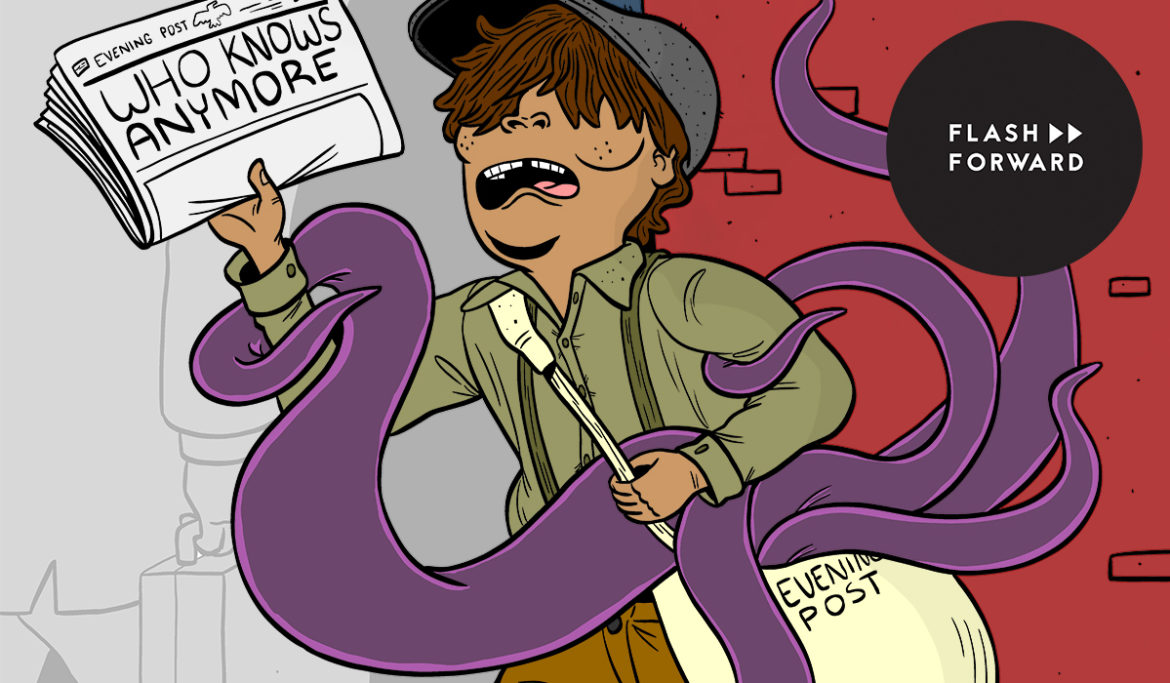
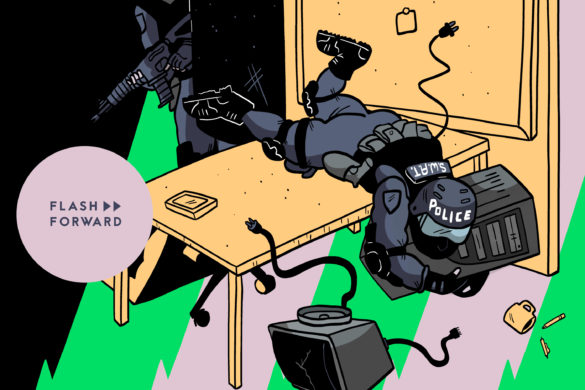
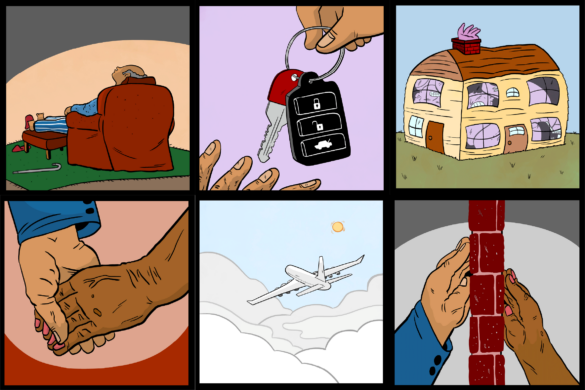
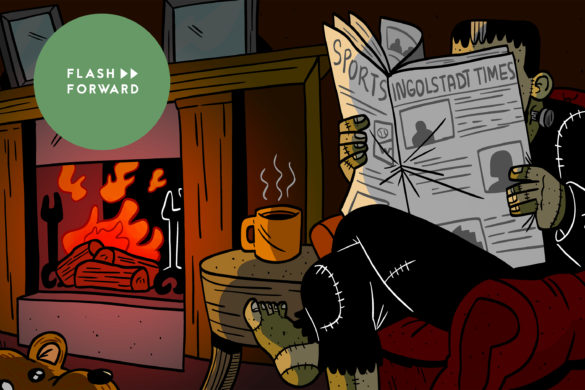
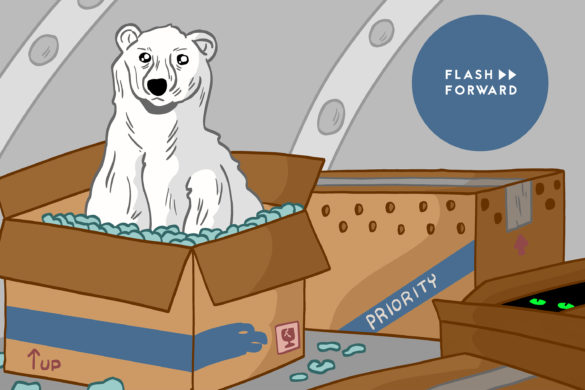
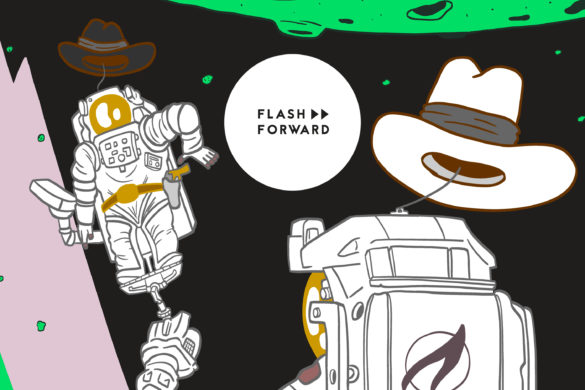

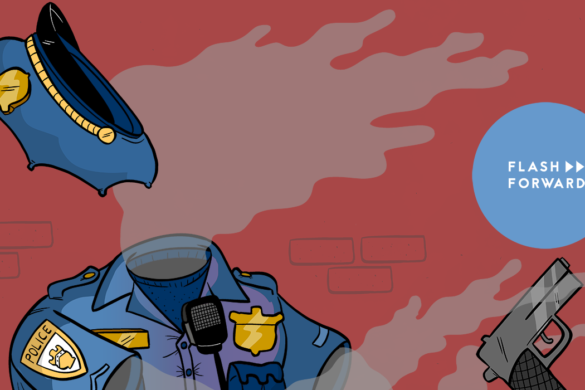
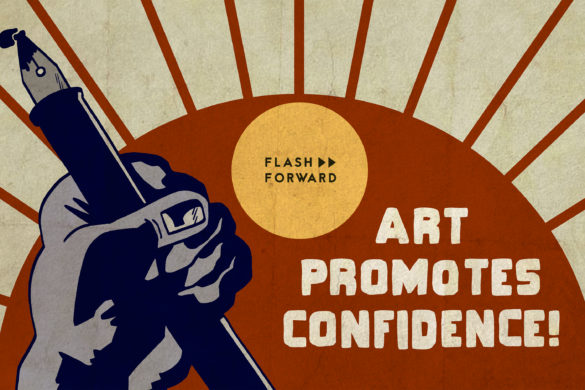
12 comments
Hey, anyone catch the name of that IT vs Scifi podcast? Can’t seem to find it.
It’s a bit tough to find but here’s the link: http://www.vmware.com/radius/scifipodcast/
Thanks so much!
Any chance you could put together a page of all your podcast recommendations? I’m always listening when on the move, so have forgotten about it (or forgotten the name) by the time I get to write it down. Thanks
The idea of people self-segregating themselves into completely independent communities depending on their beliefs reminds me of two sci-fi novels, The City & the City by Chinba Mieville, and Lockstep by Karl Schroeder.
I really enjoyed the concept behind The City & The City but I didn’t even make the connection between that and this episode, good call!
▹▹ Rose
http://feeds.soundcloud.com/playlists/soundcloud:playlists:274256160/sounds.rss
I made a RSS feed for the IT >SCI-FI Podcast if that helps. You should just be able to copy it into your podcatcher and it subscribe to it
Thanks. RSS rocks.
[…] from the Flash Forward episode “Extra! Extra!”, here are two things you can do before sharing anything on social […]
Hi! I have been going over this site with a figurative fine-toothed comb trying to see if I can get a transcript of this episode for my Critical Thinking and Reading college class. I’m probably looking right at it… help?
[…] (Please click the link to go to the podcast.) […]
[…] any news that disagrees with one’s established viewpoints as “fake news.” In this context, it’s easy to believe everything we read on the internet, even if it’s not true. This makes it difficult to accurately assess the truthfulness and […]